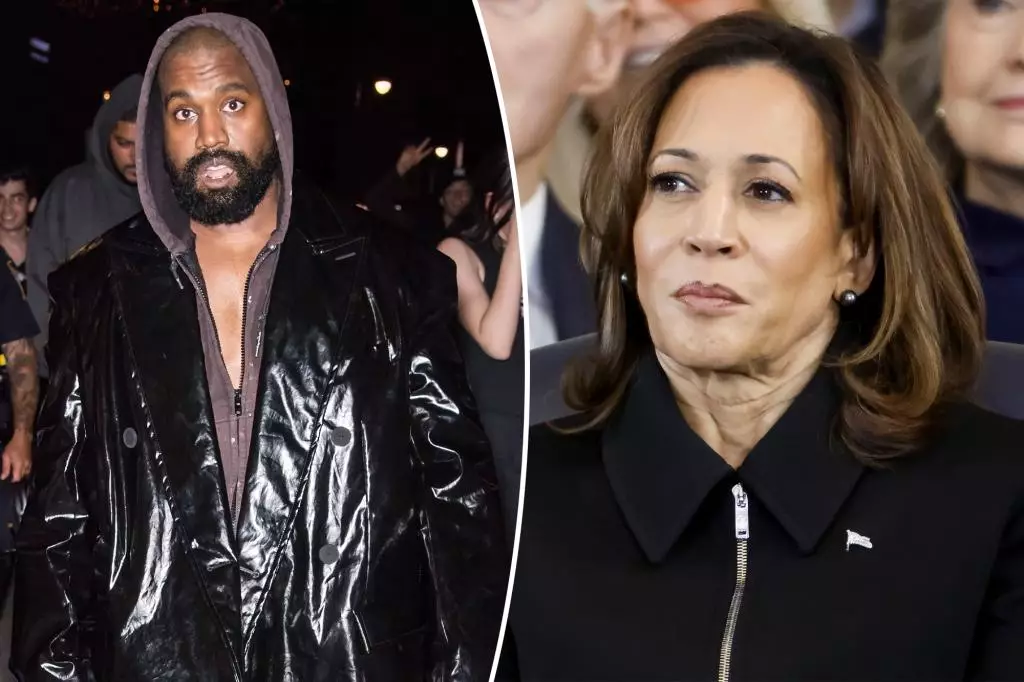In the realm of celebrity culture, public figures often navigate a landscape fraught with scrutiny, sensationalism, and sometimes scandal. Recently, Kanye West stirred the pot yet again with an audacious tweet directed at former Vice President Kamala Harris that led to a public apology, igniting extensive discussions about boundaries, respect, and accountability in the age of social media. This incident illuminates not only West’s complicated relationship with controversy but also raises essential questions about the responsibility of public figures in their narratives.
Kanye West’s contentious tweet, which stated, “I used to want to f-k Kamala until she lost. I don’t f-k losers anymore,” serves as a stark illustration of how celebrity discourse can veer into disrespectful territory. His comments were fueled by the context of the 2024 presidential election, where Harris, representing the Democratic Party, was defeated by Donald Trump. The tweet’s sexualized nature and flippant dismissal of Harris’ political stature drew immediate backlash, culminating in West deleting the post.
The following tweet further escalated the situation, featuring comments that seemingly dismissed the Democrats’ influence over him, claiming, “Dey don’t control black people no more. Trump 4 life.” These remarks not only punctuated West’s impulsive engagement with political commentary but also underscored a misguided approach to identity and political affiliations. Such statements can have far-reaching implications, particularly when they trivialize the hard-fought political advancements made by marginalized groups.
Following the uproar, Kanye West issued an apology to Kamala Harris. While the act of apologizing is generally seen as positive, one must question the sincerity behind it, especially given West’s history of erratic behavior and controversial statements. Is his apology a genuine acknowledgment of a boundary crossed, or merely a response to public outcry? This nuance matters because apologies from public figures can sometimes feel like rehearsed damage control rather than authentic reflections of regret.
The circumstance beckons a larger conversation about the responsibility that comes with public platforms. A celebrity’s carrier in persuasion can easily transform into one of recklessness. The repercussions of West’s tweet ripple through societal attitudes toward political figures, particularly women and people of color, potentially reinforcing harmful stereotypes while perpetuating a culture of disrespect.
This isn’t the first time Kanye West has found himself entrenched in controversy, and the media often exploits these moments. Comparably, the longstanding tension between West and pop star Taylor Swift traces back to the infamous 2009 MTV VMA interruption where West asserted that Beyoncé deserved the award Swift was receiving. The impact of this incident continues to resonate, with West making further contentious remarks about Swift in later years. The complexity of their relationship has been intertwined with broader discussions about feminism, power dynamics, and the perceptions of black artists in a predominately white industry.
As both artists prepare for the upcoming 2025 Grammy Awards, their professional paths are set to cross once again, amidst a backdrop of unresolved tension. This upcoming event highlights the entertainment industry’s tendency to keep feuds in the public eye, where the spectacle often overshadows the necessity of dialogue and reconciliation.
The incident between Kanye West and Kamala Harris serves as a crucial reminder of the need for reflection within celebrity culture. It prompts both public figures and their audiences to consider the implications of words and actions in a highly interconnected digital landscape. As members of society, we must hold celebrities accountable while being vigilant about the lines they often tread. The effective use of social media should lead to constructive discourse rather than perpetuating harmful stereotypes and dismissive narratives.
The evolving narrative of Kanye West offers a lens through which we can evaluate our own engagement with celebrity culture. It invites discourse around respect, accountability, and the potent influence that comes with a public platform. Apologies, in this context, should be viewed not merely as performative gestures but as opportunities for genuine engagement and growth — both personally and publicly.


Leave a Reply